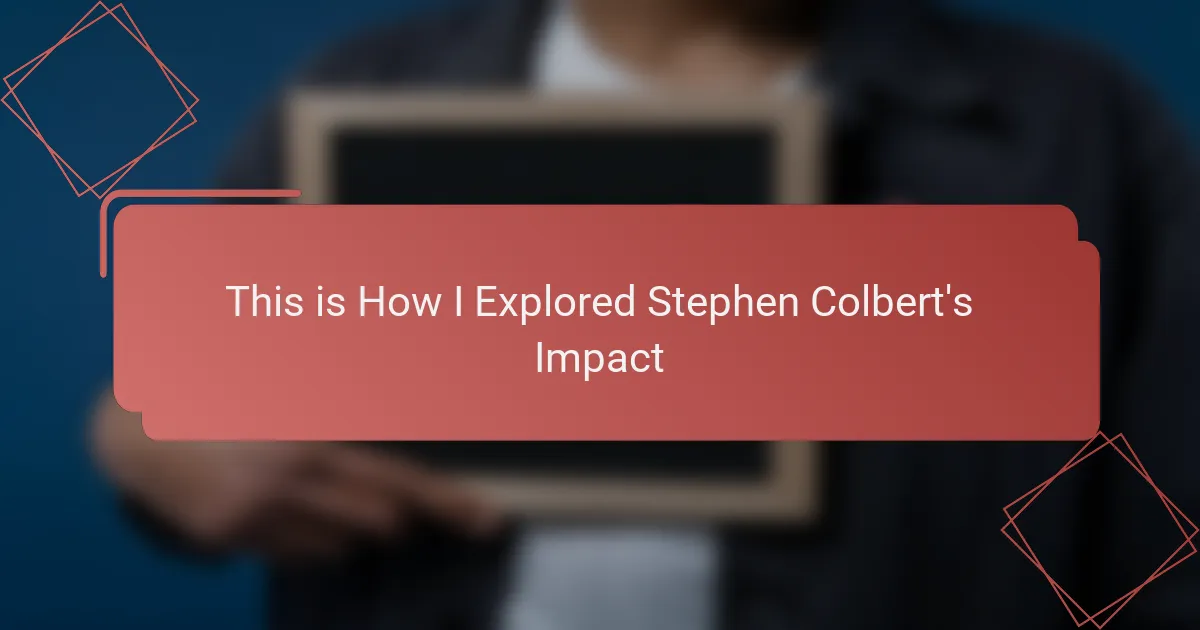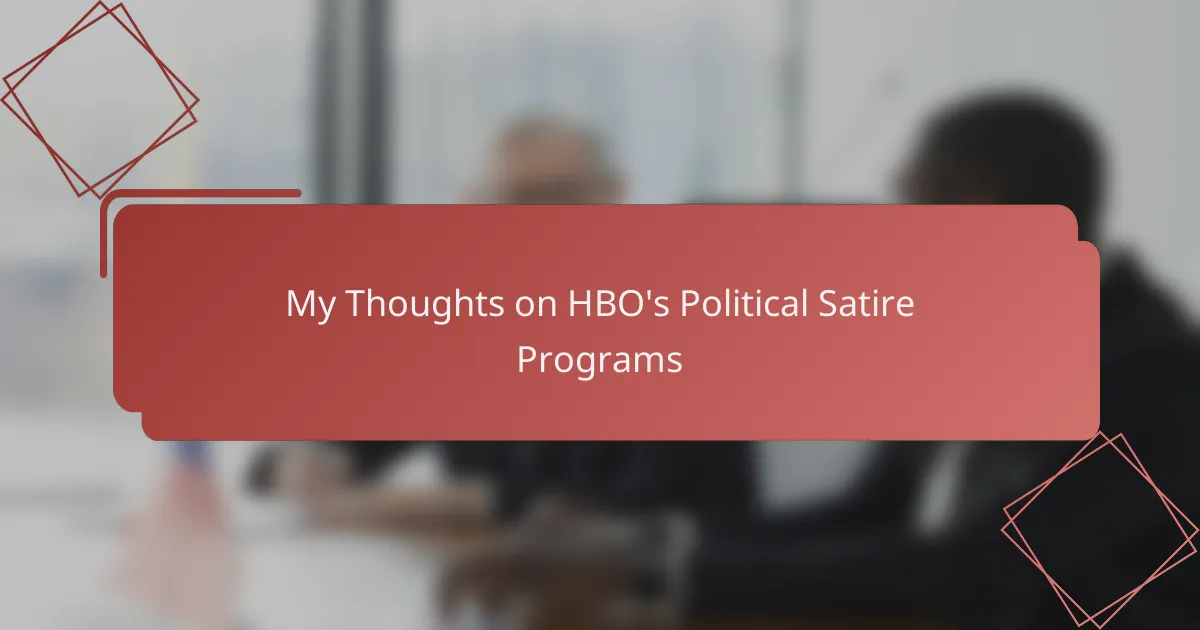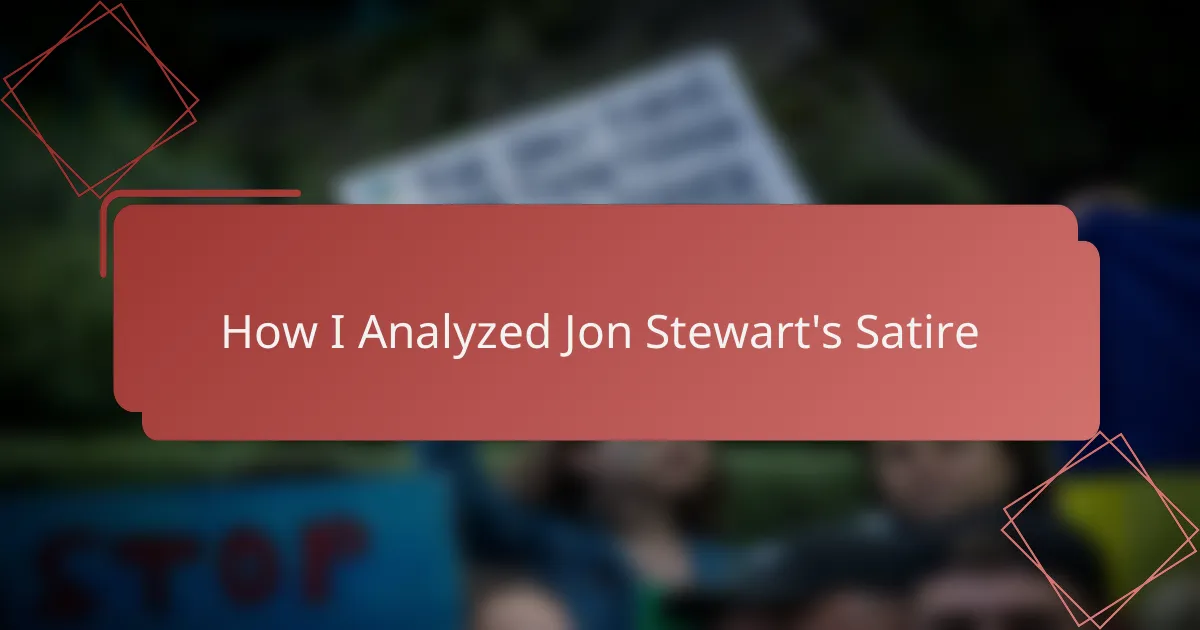Key takeaways
- Political satire, like Stephen Colbert’s, reveals uncomfortable truths while engaging audiences in critical thinking about political issues.
- Colbert uses humor through irony, exaggeration, and sarcasm to make complex topics accessible and engaging.
- His satire can influence public discourse by encouraging discussions around media bias, hypocrisy, and political narratives.
- Effective audience engagement techniques include direct address and relatable anecdotes, fostering a sense of connection and community.
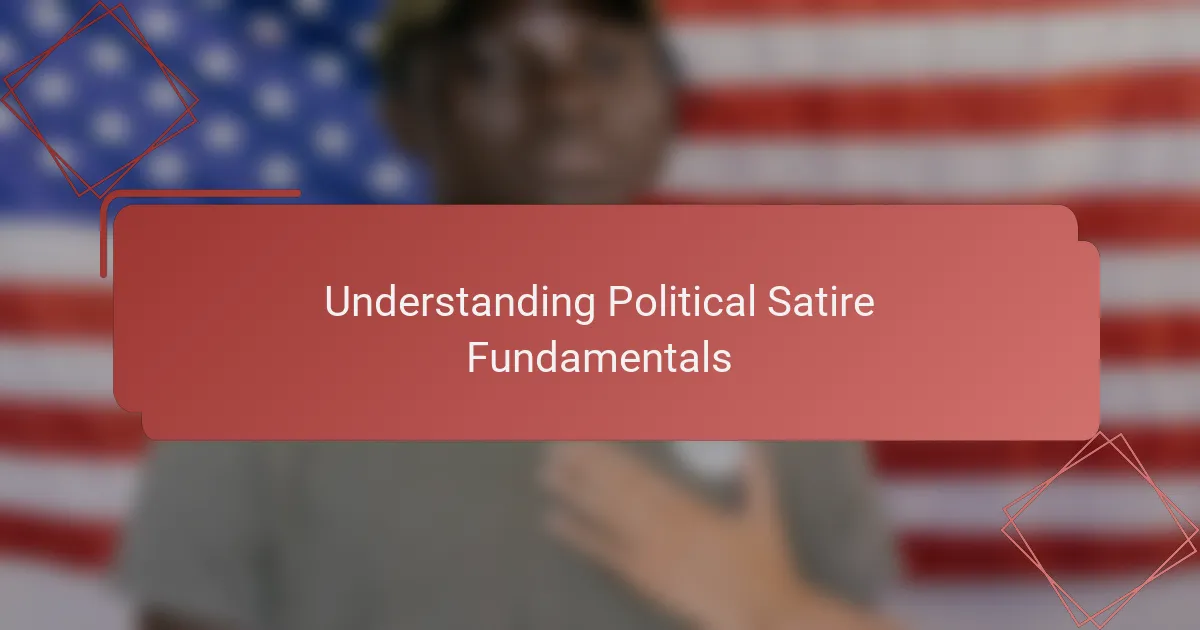
Understanding Political Satire Fundamentals
Political satire, at its core, is about holding a mirror to society using humor and wit. When I first encountered it, I realized it’s not just about making jokes; it’s about revealing uncomfortable truths in a way that sticks with you. Have you ever paused mid-laugh because a satirical punchline hit too close to reality? That’s the power of political satire.
What fascinates me is how satire blends criticism with entertainment, making complex political issues accessible. It’s like a conversation where the comedian becomes both a storyteller and a truth-teller. This balance is delicate—too harsh, and it alienates; too soft, and it loses impact. Understanding this helps me appreciate the craft behind each clever jab.
I’ve noticed that effective political satire doesn’t just mock; it invites reflection. It challenges us to question our beliefs while laughing at the absurdity around us. Don’t you think that’s a unique way to engage people in political discourse? For me, that’s what makes analyzing satire so rewarding—it’s humor with a purpose.
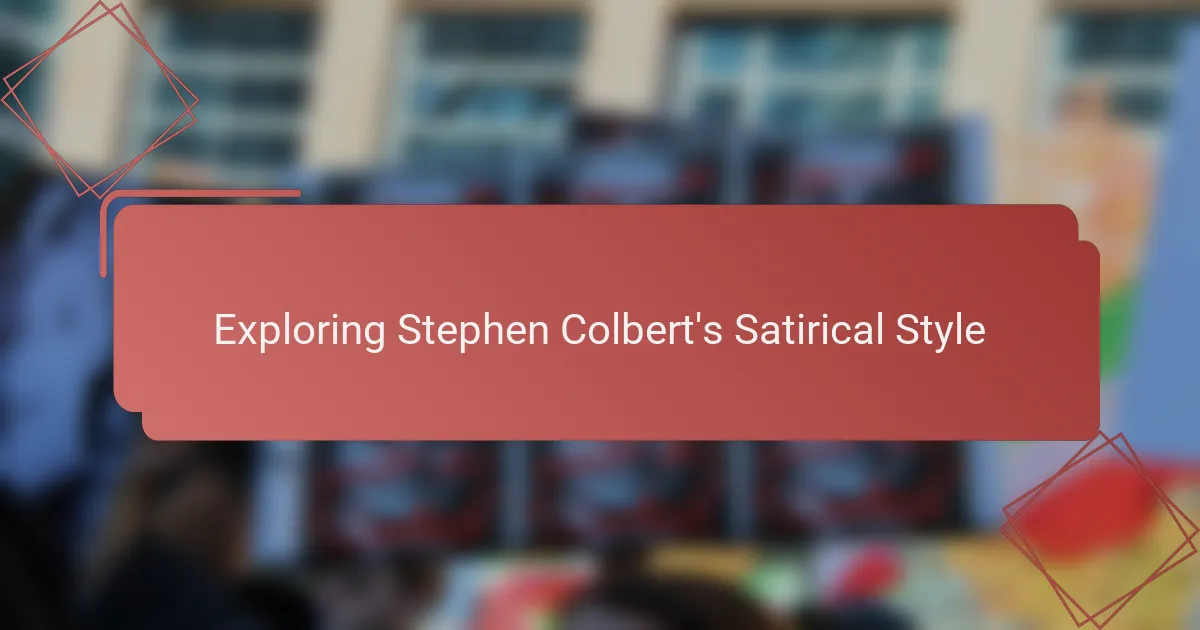
Exploring Stephen Colbert’s Satirical Style
Stephen Colbert’s satirical style is a brilliant blend of sharp wit and layered irony. What I find fascinating is how he uses exaggeration not just to entertain but to expose the absurdities within political discourse. Watching his shows, I often catch myself chuckling and then pausing to reflect on the deeper truths masked by his humor.
| Aspect | Stephen Colbert’s Satirical Style |
|---|---|
| Approach | Parody of conservative pundit persona to critique political issues |
| Tone | Sharp, ironic, often deadpan delivery |
| Techniques | Exaggeration, irony, sarcasm, and rhetorical questions |
| Impact | Encourages critical thinking through humor, making political commentary accessible and engaging |

Analyzing Key Political Themes in Colbert’s Work
Stephen Colbert’s sharp wit often targets the power dynamics within politics, a theme that stood out to me as I dived deeper into his work. His ability to expose hypocrisy and challenge authority through humor made me reflect on how satire can influence public opinion and encourage critical thinking.
One of the most striking aspects of Colbert’s political satire is his focus on media manipulation, partisan bias, and the absurdity of political spin. These themes not only entertain but also highlight real issues, prompting viewers to question the narratives they consume daily. From my experience watching his show, I found myself more skeptical and engaged with political news, which shows how effective his satire really is.
- Media manipulation and the role of news outlets
- Partisan bias and political polarization
- Hypocrisy and contradictions in political rhetoric
- The absurdity and theatricality of political campaigns
- The impact of satire on public discourse and voter awareness

Assessing Audience Engagement Techniques
Assessing how Stephen Colbert engages his audience reveals a masterclass in blending humor with sharp political commentary. From my perspective, his ability to maintain a connection through direct address paired with clever satire makes viewers feel they are part of a shared political conversation rather than passive spectators. I’ve noticed this firsthand—his pauses and timing often prompt reactions that feel almost conversational, which I find particularly effective in keeping the audience hooked.
| Audience Engagement Technique | Effectiveness |
|---|---|
| Direct Address and Eye Contact | Creates a sense of intimacy and trust with viewers. |
| Use of Irony and Sarcasm | Encourages critical thinking while entertaining simultaneously. |
| Interactive Social Media Presence | Extends the conversation beyond the show, building community. |
| Personal Anecdotes in Monologues | Humanizes complex political issues, making them relatable. |

Measuring Colbert’s Influence on Political Discourse
Measuring Stephen Colbert’s influence on political discourse isn’t straightforward, but one way I gauge it is by observing how his satire seeps into everyday conversations. I’ve caught myself and friends referencing a Colbert joke or phrase while debating current events, which tells me his humor isn’t just fleeting entertainment—it shapes how people process politics. Have you noticed how certain satirical lines stick with you long after the show ends?
Another metric that I find revealing is the shift in public engagement with political issues following his segments. When Colbert tackles a topic, I often see spikes in social media discussions and news coverage that frame the conversation in ways reminiscent of his satire. From my experience, this ripple effect shows his ability to set the agenda, blending humor with commentary that resonates beyond the screen.
Finally, the true measure of Colbert’s impact, in my opinion, lies in how he encourages critical thinking among his audience. I’ve witnessed viewers who initially tuned in for laughs gradually start questioning partisan rhetoric and media spin, a change that reflects Colbert’s deeper influence on political awareness. Isn’t that the ultimate goal of satire—to make us laugh, but also think?
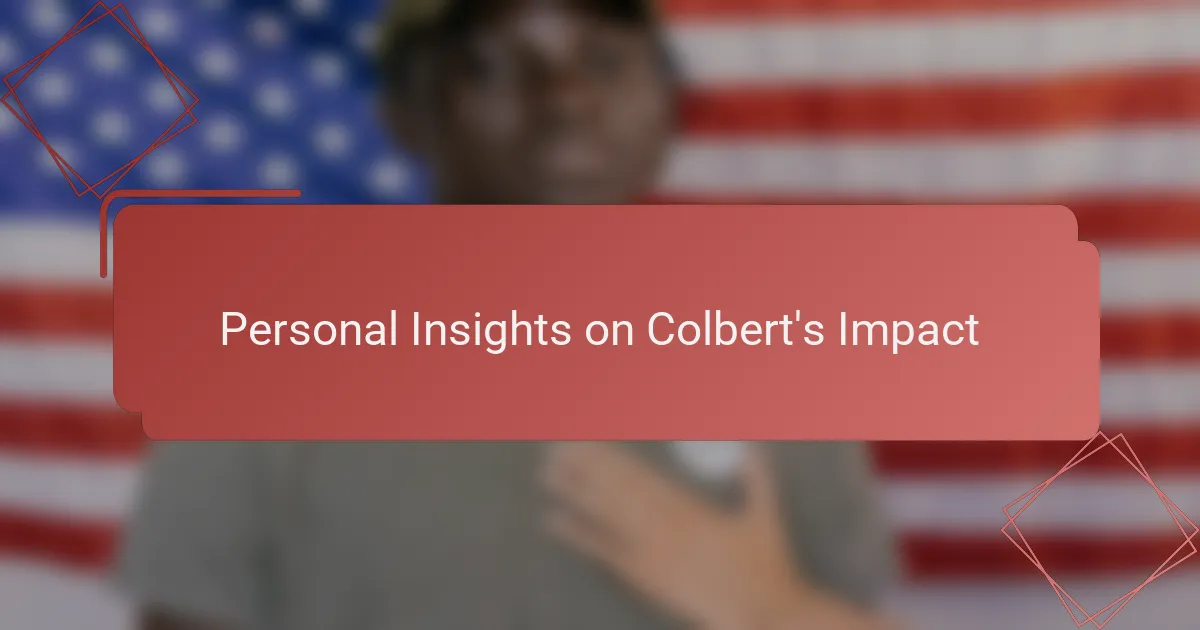
Personal Insights on Colbert’s Impact
Exploring Stephen Colbert’s impact personally, I realized how his unique blend of sharp wit and earnest storytelling reshaped my understanding of political satire. Watching his shows, I found myself not just entertained but more critically engaged with current events, which sparked lively debates with friends and family—moments I treasure deeply.
What struck me most was Colbert’s ability to humanize complex political issues without diluting their seriousness. His approach made me feel smarter, more informed, and sometimes even hopeful in the chaos of modern politics.
- Colbert’s satire encourages critical thinking rather than passive consumption.
- His persona bridges the gap between comedy and sincerity, making political discourse more accessible.
- I noticed how his work fostered community discussions, turning individual reflections into shared conversations.
- His impact goes beyond humor, shaping the way I perceive media bias and political accountability.

Applying Satire Lessons in Modern Commentary
Applying satire lessons in modern commentary has shown me how Stephen Colbert masterfully balances humor with sharp political critique. His technique of embodying a persona invites viewers to question narratives in a way that feels both entertaining and enlightening. When I tried incorporating this method, I noticed my own commentary gained a new edge—it provoked thought without losing the audience’s interest.
| Satire Element | Modern Commentary Application |
|---|---|
| Persona Adoption | Engages audience by presenting biased selves, encouraging critical thinking |
| Irony & Sarcasm | Highlights contradictions in political statements, making them memorable |
| Exaggeration | Emphasizes absurdities to provoke reflection and laughter simultaneously |
| Audience Interaction | Uses humor as a gateway to deeper discussions and awareness |
